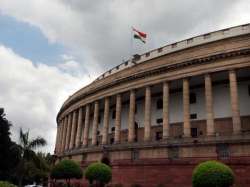Parliament on Friday unanimously passed a Bill that seeks to raise threshold for an airport to qualify as Major airport, reducing the tariff-fixing power of airport regulator to fewer airports.
The Airports Economic Regulatory Authority of India (Amendment) Bill, 2019, which was passed by Rajya Sabha on July 16, will become law after President's approval.
Presenting the government point of view while moving the Bill, Civil Aviation Minister Hardeep Singh Puri said this legislation amends the Airports Economic Regulatory Authority of India Act, 2008, which established the Airports Economic Regulatory Authority of India (AERA).
He said the Bill will not affect the AERA powers and performance will not be compromised.
Currently, an airport with an annual passenger traffic of 15 lakh or more is defined as Major airport and tariff at such airports are determined by Airports Economic Regulatory Authority of India or AERA. The Bill raises the threshold to 35 lakh and as a result many airports would come out of the purview of the regulator.
"After amendment, 16 of the airports will be within the ambit of AERA. And 17 will exclude, which means those airports which will be excluded will not go to private players. Those will be regulated by the Ministry of Civil Aviation," said Puri.
"All the other airports which would not be Major airports will continue to be looked after for these purposes (tariff determination) by the Ministry of Civil Aviation and the Government of India," he added.
Once the Bill becomes an Act, many airports for which various fees such as landing and parking charges which are currently determined by AERA will go away. Tariff at these airports would be determined by the Ministry of Civil Aviation.
The amendment also empowers the Aviation Ministry to bid out airport projects on the basis of pre-determined tariff.
Following privatization of top metro airports, the UPA government had set up airport regulator under AERA Act, 2008. Accordingly, the AERA regulates tariffs and other charges for aeronautical services provided at civilian airports with annual traffic above 15 lakh passengers. It also monitors the performance standard of services across these airports.
The Bill to amend the AERA Act is aimed at easing the burden of the airport regulator as with exponential rise in air passenger traffic, the load on AERA has significantly gone up.
Further, it has become difficult on the part of the regulator to efficiently determine the tariffs and monitor the service standards of major airports with its limited resources.
Discussing the Bill, various members of the opposition in Lok Sabha argued that the regulatory authority should be strengthened to handle additional work load instead of taking away airports away from its tariff control.
When the AERA Bill was passed in 2008, there were 11 airports with annual passenger traffic of more than 15 lakh, but with high growth in aviation sector, the number has almost trebled.
ALSO READ: Resident doctors in Delhi continue strike against NMC bill; healthcare services to remain affected
ALSO READ: Bill for timely insolvency resolution passed in Lok Sabha
Latest India News
